
TELECOMMUNICATION SYSTEMS
Scope & Guideline
Connecting Ideas: Bridging Theory and Application
Introduction
Aims and Scopes
- Wireless Communication Technologies:
Research on various wireless communication technologies, including 5G, 6G, and IoT, emphasizing advancements in network architecture, protocols, and performance optimization. - Network Security and Privacy:
Exploration of security mechanisms and privacy-preserving techniques in communication networks, addressing vulnerabilities and proposing robust solutions. - Machine Learning and Artificial Intelligence Applications:
Integration of ML and AI techniques in telecommunications, focusing on enhancing network performance, resource optimization, and intelligent decision-making. - Energy Efficiency and Green Communications:
Studies aimed at improving energy efficiency in communication systems, including energy-aware protocols and sustainable network designs. - Signal Processing Techniques:
Development of advanced signal processing algorithms for improving the reliability and efficiency of communication systems, including MIMO and OFDM. - Cognitive Radio and Spectrum Management:
Research on cognitive radio technologies and spectrum sharing strategies to enhance the utilization of available frequency resources. - Quality of Service (QoS) and Performance Analysis:
Investigations into QoS provisioning, traffic management, and performance metrics for various network architectures, ensuring reliable service delivery.
Trending and Emerging
- 6G and Future Communication Technologies:
Increased focus on 6G technologies and their implications for future communication systems, addressing challenges and innovations in high-speed, low-latency networks. - Internet of Things (IoT) and Smart Technologies:
Growing research on IoT applications, including smart cities, health monitoring, and industrial IoT, emphasizing connectivity, scalability, and security. - Artificial Intelligence in Telecommunications:
A significant rise in the application of AI and machine learning for optimizing network management, predictive maintenance, and enhancing user experience. - Edge Computing and Federated Learning:
Emerging interest in edge computing paradigms and federated learning approaches, focusing on data processing closer to the source to reduce latency and enhance efficiency. - Security in Emerging Networks:
Increased publication of studies addressing security challenges in next-gen networks, including post-quantum cryptography and secure communication protocols. - Sustainability and Green Networking:
Research into sustainable practices and energy-efficient designs in telecommunications, aligning with global efforts towards reducing carbon footprints. - Advanced MIMO and Beamforming Techniques:
A notable increase in research on advanced MIMO configurations and beamforming strategies to enhance capacity and coverage in wireless networks.
Declining or Waning
- Traditional Telecommunication Protocols:
Research on conventional telecommunication protocols is decreasing, likely due to the rapid evolution of new standards and technologies that require innovative approaches. - Legacy Network Technologies:
As the industry transitions to next-generation networks, studies focusing on legacy technologies such as 2G and 3G are becoming less relevant and less frequently published. - Static Network Architectures:
There is a noticeable decline in research concerning static network architectures, as the focus shifts towards dynamic, software-defined, and virtualized networking solutions. - Basic Signal Processing Techniques:
Research on rudimentary signal processing methods is waning, with more emphasis now placed on advanced and adaptive techniques relevant to modern communication challenges. - General Surveys without Novel Contributions:
Surveys that do not provide novel insights or advancements in the field are becoming less common, as the journal seeks to prioritize original research and innovative findings.
Similar Journals
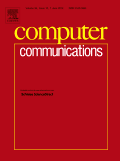
COMPUTER COMMUNICATIONS
Advancing the Frontiers of Computer NetworkingCOMPUTER COMMUNICATIONS is a premier journal published by Elsevier, covering cutting-edge research in the field of computer networks and communications. With an impressive 2023 Scopus ranking placing it in the 95th percentile and classified as Q1 in its category, this journal embodies the forefront of technological advancement and scholarly excellence. Since its inception in 1978 and poised to continue until 2024, COMPUTER COMMUNICATIONS serves as an essential platform for disseminating high-impact research that advances our understanding of computer networking protocols, architectures, and applications. Although it is not an open-access publication, the journal provides various access options to ensure that its findings are widely circulated among researchers, professionals, and students. Through rigorous peer review and a commitment to fostering innovation, COMPUTER COMMUNICATIONS plays a vital role in shaping the future of communication technologies.
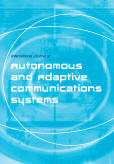
International Journal of Autonomous and Adaptive Communications Systems
Pioneering Research at the Intersection of Technology and CommunicationInternational Journal of Autonomous and Adaptive Communications Systems, published by INDERSCIENCE ENTERPRISES LTD, serves as a vital platform for researchers and professionals engaged in the dynamic fields of autonomous systems and adaptive communication technologies. Since its inception in 2008, this peer-reviewed journal has contributed to the advancement of knowledge within the realms of Computer Science and Electrical and Electronic Engineering, albeit currently positioned in the Q4 quartile, suggesting substantial opportunities for growth and influence within these disciplines. With an emphasis on innovative research tackling challenges in autonomous communication frameworks, the journal invites submissions that explore the convergence of various technologies and their applications. While the journal does not offer open access, it remains a significant resource for academia and industry at large, facilitating collaboration and dialogue among emerging scholars, seasoned experts, and applied practitioners in the UK and beyond. The journey of this journal from 2008 to its ongoing publications through 2024 reflects a commitment to fostering academic discourse in this essential area of study.

International Journal of Electronics and Telecommunications
Fostering Collaboration in Electronics and TelecommunicationsWelcome to the International Journal of Electronics and Telecommunications, a prominent publication dedicated to the evolving fields of electronics, telecommunications, and computer networks. Established by the Polska Akademia Nauk (Polish Academy of Sciences), this journal is committed to fostering academic research and technological advancements within these crucial domains. As of 2023, it holds a Q4 ranking in both Computer Networks and Communications and Electrical and Electronic Engineering, showcasing its role as a platform for emerging ideas and groundbreaking studies. With an Open Access model implemented since 2013, it enhances the visibility and accessibility of its articles, encouraging a broader impact and collaboration among researchers, professionals, and students alike. The journal serves as an important resource for those interested in the intersection of technology and communications, and it continues to contribute to the academic dialogue surrounding these vital sectors.
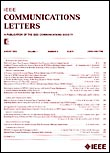
IEEE COMMUNICATIONS LETTERS
Advancing the Frontiers of Communication TechnologyIEEE Communications Letters, published by the esteemed IEEE - Institute of Electrical and Electronics Engineers, is a leading journal in the fields of Computer Science Applications, Electrical and Electronic Engineering, and Modeling and Simulation. Since its inception in 1997 and continuing through to 2024, this journal has consistently ranked in the prestigious Q1 quartile across its categories, reflecting its high quality and substantial impact in the academic community. With an impressive Scopus rank, particularly standing at #24 in Mathematics - Modeling and Simulation, the journal serves as an essential resource for researchers, professionals, and students eager to stay at the forefront of innovative communications technologies. Although it does not offer open access, the journal ensures rigorous peer review and publication of concise, impactful articles that push the boundaries of research and application. Whether you’re involved in theoretical developments or practical implementations, IEEE Communications Letters provides critical insights that shape the future of engineering and technology.

Telecom is an esteemed peer-reviewed journal published by MDPI, specializing in the fields of computer networks and communications as well as electrical and electronic engineering. Since its inception in 2020, this Open Access journal has provided a platform for innovative research and advancements in telecommunication technologies, making significant contributions to both academia and industry. With an impressive impact factor and a category rank of Q2 in the 2023 Scopus rankings, Telecom continues to be a valuable resource for researchers, professionals, and students seeking to engage with cutting-edge developments in telecommunication. The journal invites high-quality manuscripts that explore emerging trends, challenges, and solutions in the ever-evolving telecom landscape. Situated in Basel, Switzerland, Telecom is committed to fostering a global exchange of knowledge and serves as an essential conduit for advancing the discourse in telecommunications.

WIRELESS NETWORKS
Elevating Knowledge in Wireless CommunicationsWIRELESS NETWORKS is a prestigious journal published by Springer, focusing on cutting-edge research in the domains of wireless communication, computer networks, and information systems. Established in 1995 and set to converge its influential contributions until 2024, this journal has rapidly ascended to a Q2 category ranking in the fields of Computer Networks and Communications, Electrical and Electronic Engineering, and Information Systems, reflecting its significant role in advancing knowledge and innovation—ranked 75th, 151st, and 84th respectively in their fields by Scopus. Researchers and professionals alike value its contribution to the discourse on wireless technologies, making it a vital resource for professionals and students eager to stay abreast of the latest trends and findings. Although it does not offer open access, the insights gleaned from its articles are invaluable for tackling the challenges of modern communications and ensuring the efficient use of wireless networks.
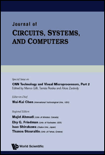
JOURNAL OF CIRCUITS SYSTEMS AND COMPUTERS
Championing Quality Research in Electronic EngineeringJOURNAL OF CIRCUITS SYSTEMS AND COMPUTERS is a pivotal publication in the fields of Electrical and Electronic Engineering as well as Hardware and Architecture, published by World Scientific Publishing Co. Pte Ltd in Singapore. With an ISSN of 0218-1266 and an E-ISSN of 1793-6454, this journal has contributed significantly to the discourse surrounding innovative research and technological advancements since its inception in the late 1990s. It currently holds a Q3 ranking in both relevant categories, reflecting its competitive stature and providing researchers, professionals, and students a substantial platform for disseminating findings. The journal covers a diverse range of topics, focusing on the design, analysis, and application of circuits, systems, and advanced computing technologies. Authors benefit from a rigorous peer-review process, ensuring high-quality publications that drive the field forward. The journal's commitment to excellence underscores its importance in fostering academic collaboration and knowledge exchange, making it a vital resource for anyone dedicated to advancing the domains of electrical engineering and computer science.
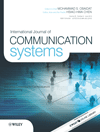
INTERNATIONAL JOURNAL OF COMMUNICATION SYSTEMS
Innovating Connections in Network EngineeringInternational Journal of Communication Systems, published by Wiley, is a premier scholarly publication dedicated to advancing the field of communication systems and network engineering. With an ISSN of 1074-5351 and E-ISSN 1099-1131, this journal has emerged as a critical resource for researchers and professionals alike, showcasing innovative research from 1994 to 2024. Holding a distinguished Q2 quartile ranking in both Computer Networks and Communications and Electrical and Electronic Engineering, it ranks within the top tiers of its field, reflecting its high impact and relevance. The journal's focus spans a wide range of topics within these disciplines, including but not limited to, advanced communication protocols, network design, signal processing, and emerging technologies. Although it does not currently offer open access options, the journal remains committed to disseminating high-quality research to contribute meaningfully to the scientific community. Researchers, professionals, and students will find invaluable insights and ideas to further their work and understanding in this dynamic field.
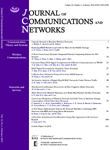
JOURNAL OF COMMUNICATIONS AND NETWORKS
Elevating Knowledge Exchange in the Digital AgeJOURNAL OF COMMUNICATIONS AND NETWORKS, published by the Korean Institute of Communications Sciences (KICS), is a leading academic journal that has been at the forefront of the fields of Computer Networks and Communications as well as Information Systems since its inception in 1999. With a strong commitment to advancing research in these critical areas, this journal has achieved a prestigious Q1 ranking in both domains as of 2023, reflecting its significant impact and innovative contributions to the field. The journal features original research, review articles, and technical notes that address the latest advancements in communication technologies, network architecture, and data management strategies. As a vital resource for researchers, practitioners, and students, it not only disseminates valuable findings but also fosters collaboration and knowledge exchange among diverse disciplines within the communications landscape. With a consistent annual volume, the journal continues to shape the future of communications science and offers authors an esteemed platform to showcase their work.

Electronics
Catalyzing Collaboration in Electronics EngineeringElectronics, published by MDPI since 2012, stands as a pivotal open-access journal that caters to a wide spectrum of disciplines within the electrical and electronic engineering domain. With a strong commitment to disseminating innovative research, this journal has garnered notable recognition, achieving a Q2 ranking in multiple pertinent categories, including Computer Networks and Communications, Control and Systems Engineering, and Signal Processing. Its editorial standards and open-access format enhance the visibility and accessibility of high-quality research, making critical advancements in technology available to a global audience. Located in Switzerland, the journal is positioned to foster international collaboration and dialogue among researchers, professionals, and students dedicated to exploring the evolving landscape of electronics and its applications. With an E-ISSN of 2079-9292, the journal is meticulously indexed in reputable databases like Scopus, further solidifying its relevance and influence in the engineering community.